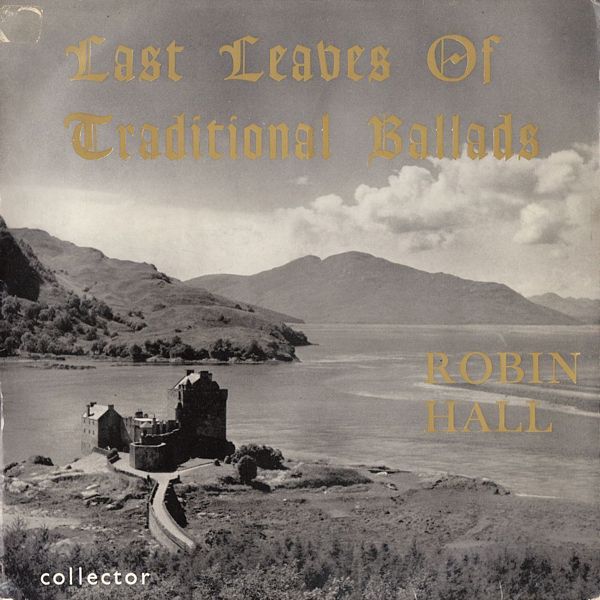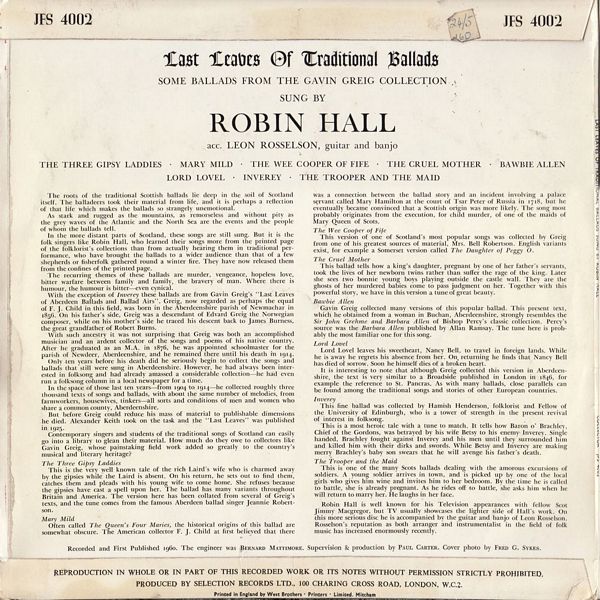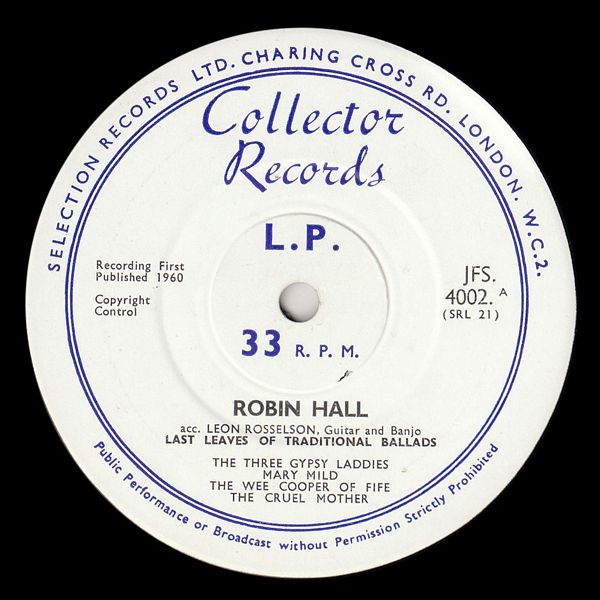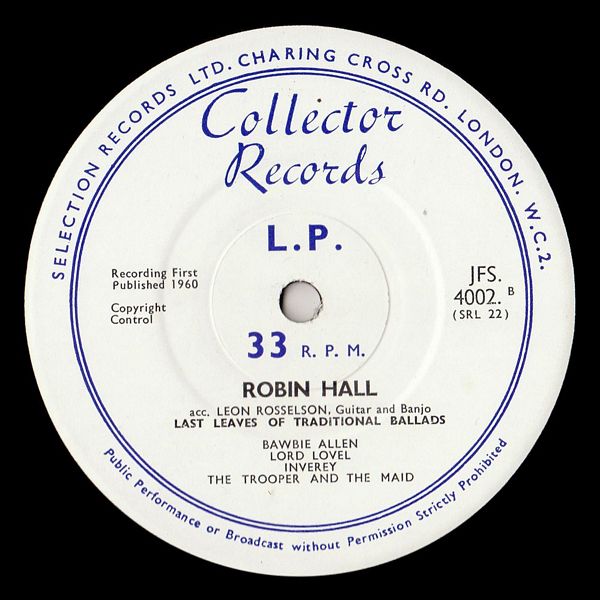

 |


 |
Sleeve Notes
The roots of the traditional Scottish ballads lie deep in the soil of Scotland itself. The balladeers took their material from life, and it is perhaps a reflection of that life which makes the ballads so strangely unemotional.
As stark and rugged as the mountains, as remorseless and without pity as the grey waves of the Atlantic and the North Sea are the events and the people of whom the ballads tell.
In the more distant parts of Scotland, these songs are still sung. But it is the folk singers like Robin Hall, who learned their songs more from the printed page of the folklorist's collections than from actually hearing them in traditional performance, who have brought the ballads to a wider audience than that of a few shepherds or fisherfolk gathered round a winter fire. They have now released them from the confines of the printed page.
The recurring themes of these ballads are murder, vengeance, hopeless love, bitter warfare between family and family, the bravery of man. Where there is humour, the humour is bitter — even cynical.
With the exception of Inverey these ballads are from Gavin Greig's "Last Leaves of Aberdeen Ballads and Ballad Airs". Greig, now regarded as perhaps the equal of F. J. Child in this field, was born in the Aberdeenshire parish of Newmachar in 1856. On his father's side, Greig was a descendant of Edvard Greig the Norwegian composer, while on his mother's side he traced his descent back to James" Burness, the great grandfather of Robert Burns.
With such ancestry it was not surprising that Greig was both an accomplished musician and an ardent collector of the songs and poems of his native country. After he graduated as an M.A. in 1876, he was appointed schoolmaster for the parish of Newdeer, Aberdeenshire, and he remained there until his death in 1914.
Only ten years before his death did he seriously begin to collect the songs and ballads that still were sung in Aberdeenshire. However, he had always been interested in folksong and had already amassed a considerable collection — he had even run a folksong column in a local newspaper for a time.
In the space of those last ten years — from 1904 to 1914 — he collected roughly three thousand texts of songs and ballads, with about the same number of melodies, from farmworkers, housewives, tinkers — all sorts and conditions of men and women who share a common county, Aberdeenshire.
But before Greig could reduce his mass of material to publishable dimensions he died. Alexander Keith took on the task and the "Last Leaves'' was published in 1925.
Contemporary singers and students of the traditional songs of Scotland can easily go into a library to glean their material. How much do they owe to collectors like Gavin Greig, whose painstaking field work added so greatly to the country's musical and literary heritage?
The Three Gipsy Laddies — This the very well known tale of the rich Laird's wife who is charmed away by the gipsies while the Laird is absent. On his return, he sets out to find them, catches them and pleads with his young wife to come home. She refuses because the gipsies have cast a spell upon her. The ballad has many variants throughout Britain and America. The version here has been collated from several of Greig's texts, and the tune comes from the famous Aberdeen ballad singer Jeannie Robertson.
Mary Mild — Often called The Queen's Four Maries, the historical origins of this ballad are somewhat obscure. The American collector F. J. Child at first believed that there was a connection between the ballad story and an incident involving a palace servant called Mary Hamilton at the court of Tsar Peter of Russia in 1718, but he eventually became convinced that a Scottish origin was more likely. The song most probably originates from the execution, for child murder, of one of the maids of Mary Queen of Scots.
The Wee Cooper of Fife — This version of one of Scotland's most popular songs was collected by Greig from one of his greatest sources of material, Mrs. Bell Robertson. English variants exist, for example a Somerset version called The Daughter of Peggy O.
The Cruel Mother — This ballad tells how a king's daughter, pregnant by one of her father's servants, took the lives of her newborn twins rather than suffer the rage of the king. Later she sees two bonnie young boys playing outside the castle wall. They are the ghosts of her murdered babies come to pass judgment on her. Together with this powerful story, we have in this version a tune of great beauty.
Bawbie Allen — Gavin Greig collected many versions of this popular ballad. This present text, which, he obtained from a woman in Buchan, Aberdeenshire, strongly resembles the Sir John Grehme and Barbara Allen of Bishop Percy's classic collection. Percy's source was the Barbara Allen published by Allan Ramsay. The tune here is probably the most familiar one for this song.
Lord Lovel — Lord Lovel leaves his sweetheart, Nancy Bell, to travel in foreign lands. While he is away he regrets his absence from her. On returning he finds that Nancy Bell has died of sorrow. Soon he himself dies of a broken heart.
It is interesting to note that although Greig collected this version in Aberdeenshire, the text is very similar to a Broadside published in London in 1846, for example the reference to St. Pancras. As with many ballads, close parallels can be found among the traditional songs and stories of other European countries.
Inverey — This fine ballad was collected by Hamish Henderson, folklorist and Fellow of the University of Edinburgh, who is a tower of strength in the present revival of interest in folksong.
This a most heroic tale with a tune to match. It tells how Baron o' Brachley, Chief of the Gordons, was betrayed by his wife Betsy to his enemy Inverey. Single handed, Brachley fought against Inverey and his men until they surrounded him and killed him with their dirks and swords. While Betsy and Inverey are making merry Brachley's baby son swears that he will avenge his father's death.
The Trooper and the Maid — This one of the many Scots ballads dealing with the amorous excursions of soldiers. A young soldier arrives in town, and is picked up by one of the local girls who gives him wine and invites him to her bedroom. By the time he is called to battle, she is already pregnant. As he rides off to battle, she asks him when he will return to marry her. He laughs in her face.
Robin Hall is well known for his Television appearances with fellow Scot Jimmy Macgregor, but TV usually showcases the lighter side of Hall's work. On this more serious disc he is accompanied by the guitar and banjo of Leon Rosselson. Rosselson 's reputation as both arranger and instrumentalist in the field of folk music has increased enormously recently.